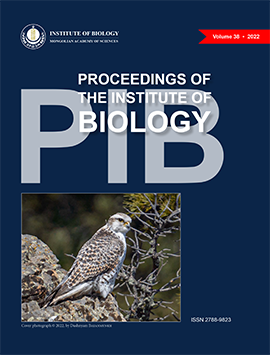Enzymatic and antibacterial activity of some actinomycete strains
DOI:
https://doi.org/10.5564/pib.v38i1.2541Keywords:
Actinomycetes, 16S rRNA, phylogenetic, enzyme, antibacterial activityAbstract
The soil samples were collected from the Tuv provinces of Mongolia. Three cultures of actinomycetes were isolated and extracted bioactive crude extract with organic solvents, and their antimicrobial activity and some enzyme activities were determined. Actinomycetes 24-TSAND1, 21-TSB8, and 54-TSB4 had protease and amylase enzyme activities Cultures of actinomycetes 24-TSAND1, 21-TSB 8, and 54-TSB4 are highly active against pathogenic bacteria Staphylococcus aureus. However, 24-TSAND1 and 21-TSB 8 cultures were not effective against Escherichia coli pathogens, while 54-TSAND4 culture was moderately active. Also, the nucleotide sequence of the 16S rRNA gene of the actinomycete 24-TSAND1 culture was determined, and the phylogenetic analysis revealed that it depends on the species of Streptomyces microflavus.
Зарим актиномицетийн нутгийн өсгөвөрүүдийн ферментийн болон бичил биетний эсрэг идэвх
Төв аймгийн хөрснөөс ялгасан актиномицетийн 3 өсгөврийг сонгон органик уусгагчаар хандлан бичил биетний эсрэг идэвх болон зарим ферментийн идэвхийг тодорхойлов. Актиномицетийн 24-Цанд1, 21-ЦБ8 болон 54-ЦБ4 өсгөврүүд нь протеаза, амилаза ферментийн өндөр идэвхтэй байна. Актиномицетийн 24-Цанд1, 21- ЦБ8, 54-ЦБ4 нутгийн өсгөврүүд өвчин үүсгэгч S. aureus–ийн эсрэг идэвх өндөртэй байна. Харин E. coli өвчин үүсгэгчийн эсрэг 24-Цанд1, 21-ЦБ8 өсгөврүүд үйлчлээгүй бол 54-ЦБ4 өсгөвөр дунд зэргийн идэвхтэй байв. Мөн актиномицетийн 24-Цанд1 өсгөврийн 16S рРНХ генийн нуклеотидийн дарааллыг тогтоож, филогенетикийн анализ хийхэд Streptomyces microflavus-ийн төрөл зүйлд хамаарч байгааг тодорхойлов.
Түлхүүр үгс: Актиномицет, 16S рРНХ ген, филогенетик, фермент, бичил биетний эсрэг идэвх
Downloads
344
References
N. Keikha, S. Ayatollahi Mousavi, G. Shahidi Bonjar, B. Fouladi, and A. Izadi, “In vitro antifungal activities of Actinomyces species isolated from soil samples against Trichophyton mentagrophytes,” Curr. Med. Mycol., vol. 1, no. 3, pp. 33–38, Sep. 2015, https://doi.org/10.18869/acadpub.cm0m.1.3.33.
M. S. Palla, G. S. Guntuku, M. K. K. Muthyala, S. Pingali, and P. K. Sahu, “Isolation and molecular characterization of antifungal metabolite producing actinomycete from mangrove soil,” Beni-Suef Univ. J. Basic Appl. Sci., vol. 7, no. 2, pp. 250–256, Jun. 2018, https://doi.org/1016/j.bjbas.2018.02.006.
Pagmadulam B, Monisha Kh, Tserendulam D, and Rentsenkhand Ts, “The taxonomic study of some actinomycetes isolated from Mongolian soils,” Proc. Mong. Acad. Sci., vol. 56, pp. 66–72, Nov. 2016, https://doi.org/10.5564/pmas.v56i3.692. (in Mongolian)
D. Prakash et al., “Actinomycetes: a repertory of green catalysts with a potential revenue resource,” BioMed Res. Int., vol. 2013, p. 264020, 2013, https://doi.org/10.1155/2013/264020.
T. Baljinova and D. D, “Antimicrobial activities of soil actinomycetes isolated with different methods from Khuvsgul and Uvs aimags and identification of actinomycetes of the genus Amycolatopsis using genus-specific primers,” Proc. Inst. Gen. Exp. Biol., vol. 31, pp. 184–191, Jan. 2015.
B. Pagmadulam et al., “Isolation and characterization of antiprotozoal compound-producing Streptomyces species from Mongolian soils,” Parasitol. Int., vol. 74, p. 101961, Feb. 2020, https://doi.org/10.1016/j.parint.2019.101961.
Pagmadulam B, Sainbileg P, Oyukhsn Kh, and Rentsenkhand Ts, “Enzymatic activities of actinomycetes isolated from soil in Tuv province of Mongolia,” Proc Inst Biol, vol. 37, pp. 9–15, 2021.
Tsetseg B, “Phylogenetic diversity of actinobacteria of the genus Kribble and their potential for production of extracellular enzymes,” Conference paper, 2022.
Tsetseg B, “Plant-microbe interactions: Actinomycetes in plant rhizosphere of Mongolian dry steppe ecosystem,” Conference paper, 2008.
K. Sarika et al., “Antimicrobial and antifungal activity of soil actinomycetes isolated from coal mine sites,” Saudi J. Biol. Sci., vol. 28, no. 6, pp. 3553–3558, Jun. 2021, https://doi.org/10.0.3.248/j.sjbs.2021.03.029.
S.-W. Liu, N. Jadambaa, A. A. Nikandrova, I. A. Osterman, and C.-H. Sun, “Exploring the Diversity and Antibacterial Potentiality of Cultivable Actinobacteria from the Soil of the Saxaul Forest in Southern Gobi Desert in Mongolia,” Microorganisms, vol. 10, no. 5, p. 989, May 2022, https://doi.org/10.3390/microorganisms10050989.
C. I. Edemekong et al., “Molecular Characterization and Bioassay of Soil Actinomycetes Strains on Multidrug Resistant Bacteria Molecular Characterization and Bioassay of Soil Actinomycetes Strains on Multidrug,” J. Biotechnol. Biochem. IOSR-JBB, vol. 8, no. 1, pp. 6–11, Feb. 2022.
E. Mulya and D. E. Waturangi, “Screening and quantification of anti-quorum sensing and antibiofilm activity of Actinomycetes isolates against food spoilage biofilm-forming bacteria,” BMC Microbiol., vol. 21, no. 1, p. 1, Jan. 2021, https://doi.org/10.1186/s12866-020-02060-7.
Downloads
Published
How to Cite
License
Copyright (c) 2022 Munguntuya Jamyanmyadag, Choidash Battsetseg, Khandaa Oyukhan, Purevjav Sainbileg, Shagdar Erdenechimeg, Tserennadmid Rentsenkhand, Baldorj Pagmadulam

This work is licensed under a Creative Commons Attribution-NonCommercial 4.0 International License.
Copyright on any research article in the Proceedings of the Institute of Biology is retained by the author(s).
The authors grant the Proceedings of the Institute of Biology license to publish the article and identify itself as the original publisher.
![]()
Articles in the Proceedings of the Institute of Biology are Open Access articles published under a Creative Commons Attribution-NonCommercial 4.0 International License - CC BY NC.
This license permits use, distribution and reproduction in any medium, provided the original work is properly cited.




